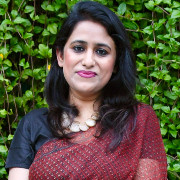We are now firmly into 2025. Anyone like me will have already failed their new year resolutions, especially the ones aimed at better fitness! That doesn’t stop one from hoping that the new year will bring change for the better.
There are enough jokes about how humans celebrate what is effectively nothing more than the Earth completing one more revolution around the Sun, but one can’t deny that a new year always brings fresh optimism.
And I think that optimism is what we celebrate.
For me, this optimism is the best part about working in research and innovation. It is the perfect place to be if you’re looking for reasons to be hopeful. Every day, my team and I are surrounded by examples of tenacious scientists and entrepreneurs who are working together in the pursuit of new discoveries. They do this because they believe in humanity’s ability to think and design our way out of complex problems.
Global disruption
It is hugely motivating. But it can feel at odds with the increasing global disruption and polarisation that surrounds us, and that was particularly prevalent in 2024. Over the last 12 months we have witnessed escalating culture wars, increasingly opposing ideologies, and sustained conflict. 2024 was also a year of the Global Elections Super-Cycle, when 49% of the world’s population went to the polls in 64 countries.
The world’s largest election took place in India where 640 million votes were cast and saw Prime Minister Modi secure a historic third term, although his first as the National Democratic Alliance coalition.
In the UK, Labour, led by Sir Kier Starmer, had a landslide win at the general election and quickly set out to establish themselves as a mission-driven government.
The UK-India collaboration
These election results may have led to many changes. But the one thing that remains unchanged is the centrality of research and innovation in economic growth, improvement in people’s health, and higher degrees of energy and food security. The UK-India collaboration in research and innovation has been playing a primary role in this direction.
Over the last 15 years, UKRI India has facilitated almost £400 million of UK-India funding, supporting over 250 projects that have led to the development of over 200 products and solutions that are being used to drive positive change in communities across India and the UK, and in some cases across the world.
Mistrust of innovation advancements
Working against a backdrop as promising as this, it is disheartening to note the growing mistrust of rapid advancements amongst wider society. The 2024 Edelman Trust Barometer reported that 2024 was the year innovation was in peril. The study showed increasing concerns about the ethics of genetically modified food or gene-based medicine, or mismanagement of new technologies like artificial intelligence. It revealed how 69% of people believe society is changing too quickly and not benefiting citizens like them.
Huge responsibility
Hope springs from the fact that 74% still rate scientists as the most trusted group in society (PDF, 1.3 MB). This is significant and presents us with a huge responsibility that we should not carry lightly.
Knowing this, we owe it to society to keep proving the value of investment in research and innovation. We need to show how it drives human and economic development and, ultimately, improves people’s lives and livelihoods. And we must remind our scientific community that we only achieve these breakthroughs when we work together to solve seemingly insurmountable problems.
Thriving through research and innovation
That is why this month, the UKRI India team is launching a new awareness campaign called ‘Thriving Through Research and Innovation’. Over the coming weeks, we will be releasing a series of short films about the work of our researchers and innovators in health, agriculture, energy, industry and climate. Each story shines a light on some of our most exciting collaborations and the real-world impact they are having within communities in the UK and in India.
Innovations like KoolMill, a revolutionary advancement in rice milling whose third-generation technology increases the yield from a rice crop by reducing breakages and wastage in the process. It also guarantees better quality, more nutritious rice for our growing global population.
Importantly, its pay-as-you-mill financing model makes it affordable for small rice millers to take on the new technology, increasing the profitability of their business without expensive capex investment or maintenance costs.
KoolMill had the idea, but in their words were “going it alone”. It was only when we were able to plug them into a network of research and innovation partners across the UK and India, could they develop and test their technology more quickly and run pilots with small and medium enterprises in India to capture vital real-world data about the benefits of their innovation. They are now partnering with rice millers across Asia, Europe and Africa to improve their livelihoods and, in doing so, improve our global food security.
The power of collaboration
Each of the stories we plan to share with you reinforces the power of collaboration. They show how interdisciplinary teams can reach solutions more effectively because they are approaching these challenges holistically, pooling their diverse skills, knowledge and talent. And they demonstrate how public-private partnerships get these good ideas to market more quickly, so communities can benefit from advancements and so we can restore their trust in innovation.
I remember during UKRI India’s 15th anniversary celebrations that I urged our partners and supporters to “unite their imaginations and shape better worlds”. This hasn’t shifted. I still firmly believe that positive, universal change is only possible through cooperation. Which is why I want us all to see 2025 as the year of collaboration.
Yes, we must continue to work harder and work with optimism. But we must also work together. And if you still need persuading, then make sure you look out for our impact films. They will show you how it is possible for us all to thrive through research and innovation.
Find out more
Watch Thriving through research and innovation: The UK-India KoolMill story (YouTube).
For International Day of Women and Girls In Science on 11 February 2025, we meet women in India and the UK who are changing the world through research and innovation – and why science needs more women like them. To find out more watch why science needs women: UKRI India (YouTube).
Extreme Photonics Applications Centre (EPIC), is a collaborative project based on a long-standing collaboration between the UK’s Science and Technology Facilities Council and India’s Tata Institute of Fundamental Research. Its mission is to develop cutting-edge control systems for high-power lasers of the future. In this video, you will learn about laser-driven accelerator technology, including its diverse knowledge base and its potential to address complex global challenges. Discover EPIC’s mission to advance innovative accelerator technology and explore the exciting applications of laser-driven accelerators across various fields, such as industry, engineering, science, medicine, and advanced materials. To find out more watch the UK-India EPIC story: thriving through research and innovation (YouTube).




